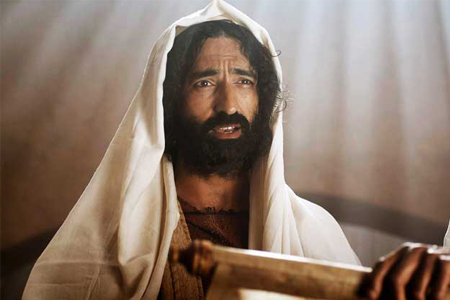Seeing that many others have undertaken to draw up accounts of the events that have taken place among us, exactly as these were handed down to us by those who from the outset were eyewitnesses and ministers of the word, I in my turn, after carefully going over the whole story from the beginning, have decided to write an orderly account for you, Theophilus, so that your Excellency may learn how well founded the teaching is that you have received.
Jesus, with the power of the Spirit in him, returned to Galilee; and his reputation spread throughout the countryside. He taught in their synagogues and everyone praised him.
He came to Nazareth, where he had been brought up, and went into the synagogue on the sabbath day as he usually did. He stood up to read, and they handed him the scroll of the prophet Isaiah. Unrolling scroll he found the place where it was written, The Spirit of the Lord has been given to me, for he has anointed me. He has sent me to bring the good news to the poor, to proclaim liberty to captives and to the blind new sight, to set the downtrodden free, to proclaim the Lord’s year of favour. He then rolled up to scroll and gave it back to the assistant, and sat down. And all eyes in the synagogue were fixed on him. Then he began to speak to them, “This text is being fulfilled today even as you listen.” (Luke 1:1-4, 4:14-21)
Reflection - Homecoming
Homecomings can turn out to be very mixed events. Initial warmth and welcome can turn, surprisingly quickly, to doubt, antagonism and rejection.
In the Gospels for this Sunday and next, Luke tells the story of Jesus’ visit to his hometown of Nazareth.
Before that story begins, however, the Church has included the very first lines of Luke’s Gospel in today’s reading. Here Luke explains, in classical literary fashion, what the purpose of his writings is: to offer an authentic and ordered account of the Christian movement, designed to give Theophilus firm reassurance about the things he has been taught.
After this introduction the first part of the story of Jesus’ homecoming follows. We will hear the second part in next week’s Gospel.
Following his temptation in the wilderness, Jesus returns to Galilee, the region in which he had grown up. He sets about teaching in the synagogues, winning many admirers.
Eventually, Jesus appears in his hometown of Nazareth and attends synagogue on the Sabbath as he usually did. He does the second reading of the synagogue service - the reading from the Prophets, in this case from the prophet Isaiah.
What Jesus reads out becomes and explanation of his mission and ministry. In the Spirit of the Lord, with which Jesus has been anointed, he will bring good news to the poor, liberty to captives, new sight to the blind, freedom to the downtrodden and proclaim a year of the Lord’s favour.
The essential good news that Jesus preaches and enacts is of God’s acceptance and welcome (not judgement) of the people who find themselves bound, trapped and afflicted.
Here Jesus sets the pattern not only for his own life and ministry, but also for those who would wish to follow him. We, too, anointed by the Spirit, are called to be God’s acceptance, welcome and freedom for all who are bound, trapped or afflicted in their lives.
In the broader context of Luke’s Gospel, this message is not to be reduced to metaphor. It is about giving real help for all who are struggling in one way or another with the concrete situations of their lives.
You can download and print our prayers and reflections for this Sunday.
pdf
Celebrating At Home 3rd Sunday in Ordinary Time [PDF]
default
Celebrating At Home 3rd Sunday in Ordinary Time [ePub]















